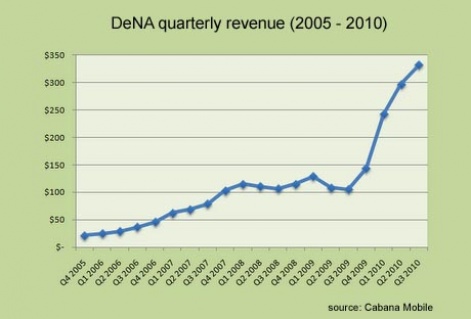Q2 FY2010 revenue was $336.4 million, up 216 percent year on year, and 12 percent from the last quarter.
Operating income was $168.7 million. This is a 342 percent increase from Q2 2009, and a 14 percent increase from last quarter.
This means DeNA is on target to hit annual revenues of $1.25 billion for 2010.
Open approach
DeNA attributes the revenue numbers to virtual goods sales within its Japanese Moba-ge-Town social mobile platform, which has over 19 million subscribers, and opened up to thirdparty developers at the start of 2010.
As of July 27, 154 developers had launched 350 games on Moba-ge-Town.
Indeed, as can clearly been seen from this graph of its revenue (from Cabana Mobile), the company's revenue was dropping until it made the decision to enable thirdparty publishing; at which point revenues took off.

"Through our various investments, DeNA has substantially increased its American presence this year," says Tomoko Namba, CEO of DeNA.
"This is in line with our cross-border, cross-device strategy of expanding DeNA to multiple regions on multiple platforms and devices."
Trash talk
DeNA also argues that its potential is already higher than industry darlings Facebook and Zynga. It calculates its ARPU is 15x larger than Zynga and 30x larger than Facebook.
"DeNA's social games are designed to generate stronger social obligation and larger word of mouth within the community," it argues, pointing out the distinction between, social, gaming, and social gaming.
"The social network is dedicated to creating a virtual social graph as opposed to a real social graph, which has a distinct advantage in the sense that people can easily get connected through their favorite games whereas your real friends do not necessarily like the same games as you do."
[source: DeNA]






















